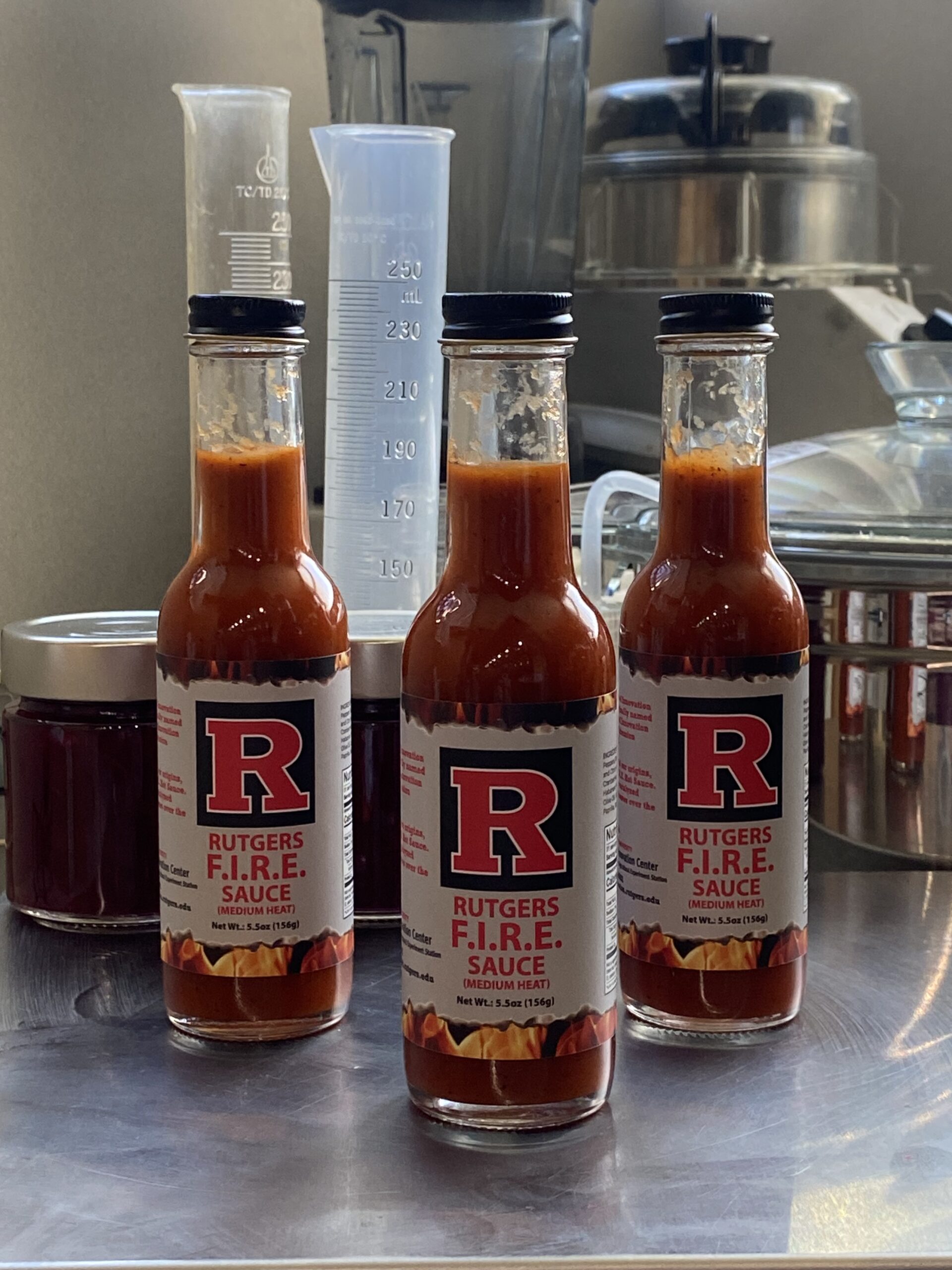
This little bottle of hot sauce helps to tell the FIC story of bringing new value-added products to market.
Like “The Little Engine That Could,” this small bottle – just 5.5 ozs – of hot sauce is meant to convey the enterprising work of the team at the Rutgers Food Innovation Center (FIC) in their quest to bring hope to entrepreneurs looking for commercial success for their food-related products.
A unique business incubator that is part of the New Jersey Agricultural Experiment Station (NJAES), the center supports start-ups as well as established businesses, here in the US and globally. FIC offers a deep well of resources to support clients from concept to commercialization and has successfully helped 3,000 businesses over the past 24 years.
Recently, the FIC team turned the tables and created their own new innovative product – Rutgers F.I.R.E. Hot Sauce, which derives its label from the original name of the center, the Rutgers Food Innovation Research and Extension Center, F.I.R.E.

Some of the team members who developed the Rutgers F.I.R.E. hot sauce. Not pictured: Nolan Lewin and Cory Piccioni.
A culinary expert, Craig Peck is the senior manager for business development at FIC. He and colleagues created this new product, in part, in recognition of the center’s origins.
However, he’s quick to point out that the new product also had a practical aim. As Peck and colleagues engage the public about what the center does, they found that trying to explain the concept of innovation hard to quantify.
“Innovation can mean different things to different people,” explained Peck. So, the idea was to have a giveaway as they deliver their ‘elevator speech’ about the capabilities of the center but also highlight its value to New Jersey agriculture and commercializing new and exciting food-related products.
Peck calls the creation of the new hot sauce a “true team effort” that includes Nolan Lewin, executive director, Julie Elmer, associate director for food technology, Zuri Masud, food technology associate, Mellonie O’Neill, who is responsible for Quality Assurance Compliance and Training, and Corey Piccioni, senior manager of production planning and facilities.
Peck talks about what makes the FIC special and how the team came up with its own in-house innovation, the new Rutgers F.I.R.E. Hot Sauce.
What makes FIC different from other food innovation and incubator facilities?
One of the big points of difference that makes FIC unique is that they are an FDA and USDA inspected facility. The products produced in our facilities are commercially viable, meaning the products can be sold to consumers.
How did the idea to create a new product come about? And why create a hot sauce?
We wanted to create a product that could be used to talk about the center and highlight our capabilities and what we do best. We felt a hot sauce was the right product and a good fit to demonstrate our capabilities. That the product is packaged in glass, is shelf stable and an acidified hot-fill product were all appealing to the team.
How did you go about creating the recipe for the sauce?
The cross functional team worked closely together and developed and tasted many iterations of the product. Part of the process was trying different ingredients and peppers. During the process, a suggestion was made to include cranberries in the formulation, and this was a key turning point in the development of the product.
 In thinking about how to create the product we knew we wanted to highlight New Jersey ingredients and tie in the agriculture in the state. The cranberries used are grown in New Jersey and are sourced from the Philip E. Marucci Center for Blueberry and Cranberry Research, one of the NJAES research centers located in Chatsworth, NJ.
In thinking about how to create the product we knew we wanted to highlight New Jersey ingredients and tie in the agriculture in the state. The cranberries used are grown in New Jersey and are sourced from the Philip E. Marucci Center for Blueberry and Cranberry Research, one of the NJAES research centers located in Chatsworth, NJ.
The variety of peppers we used are pumpkin habanero peppers sourced from Rutgers Gardens and the honey in the hot sauce was from our own Nolan Lewin’s hives in Hammonton, NJ.
We also wanted this product to demonstrate how to create value-added products utilizing the agricultural products grown within the state. Doing so directly helps local farms and agriculture, and this leads to economic growth and job creation. This is an important part of what we do at FIC.
How does the Rutgers F.I.R.E. hot sauce compare to other hot sauces?
FIC has worked with many hot sauces over the years. In addition, the team typically tastes about 200 to 300 hot sauces a year, so it is a category we are very familiar with.
The Rutgers F.I.R.E. Hot Sauce has an interesting flavor profile, different from many other hot sauces. The cranberries in the product give the hot sauce an interesting tart flavor and a richer ruby red appearance.
What has been the reaction from people who’ve tasted the product?
Nothing but rave reviews. We keep getting requests for additional samples. This kind of enthusiastic reception is motivating us to come up with new products. Stay tuned.

